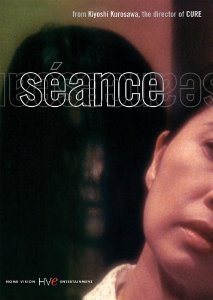Seance
 Kiyoshi Kurosawa's Seance (2000) is a magnificent little picture, encapsulating the best suspense and shocker moments that Japanese horror typically offers with Kurosawa’s customary blend of philosophy and social commentary. This film, much like his contemporary masterpiece Pulse, combines genre elements with literate references to doppelgangers and Freudian analysis, allowing the “godfather of J-horror” to work his magic once more.
Kiyoshi Kurosawa's Seance (2000) is a magnificent little picture, encapsulating the best suspense and shocker moments that Japanese horror typically offers with Kurosawa’s customary blend of philosophy and social commentary. This film, much like his contemporary masterpiece Pulse, combines genre elements with literate references to doppelgangers and Freudian analysis, allowing the “godfather of J-horror” to work his magic once more.Sato (Kôji Yakusho), a sound-effects engineer, and his wife Junko (Jun Fubuki), a psychic, experience a sudden trauma and external shock when they discover that a kidnapped girl and hid away and suffocated inside one of Sato’s equipment cases while he was in the woods recording sounds (the girl was trying to escape from a pedophile). Since the police have sought out Junko for help on this case, Sato’s wife conspires to hide the body away so that her talents might later “find” her. Obviously, given its genre elements, the girl’s ghost starts to plague them, haunting them for consciously refusing to take ownership of their part in the crime.
Throughout all of this, Kurosawa grounds the film in a denunciation of fate, alternately letting his characters believe they can escape fate and other times surrendering to it. Indeed, though the intellectualism offered in the first few minutes initially feels added on, the last act returns to a more introspective and questioning consideration of fate, denial, and acceptance, thus letting the initial intellectualism feel more fluent and integrated than it first did.
Likewise, there are a handful of absolutely incredible images in this film, with one of the strongest being Sato’s hallucination of his doppelganger and his attempt to set it aflame as a repudiation of all that this Other of omnipresent guilt represents. The communication between husband and wife is soon shattered as the secret eats at them, and their misguided belief that they can externalize their agony by switching from their house to a hotel room to avoid their predicament offers Kurosawa’s knowing rebuke that these matters are at all times truly internal. The antagonism that the husband and wife channel at each other midway through, then, breaks through the initial repose they feel at their “escape.”
Everything in this film is fully fleshed out while maintaining the ambiguity of intention that is Kurosawa’s trademark. Ergo, the film is complete even as its ending stops just before answers are externalized. Why?--because like all good psychological drama, the answer has been made explicit internally. This is better than his highly regarded Cure, better than environmentalist and minimalist drama Charisma, and just inches ahead of Bright Future. An excellent film from a contemporary wunderkind.
Seance: 9/10

0 Comments:
Post a Comment
<< Home